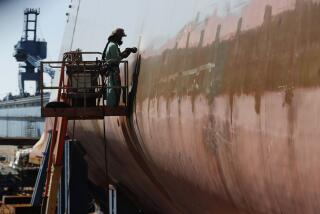Northrop Sole Supplier of Sensor, Panel Told : Hearings: A Marine colonel says the Navy had no choice on a $300,000 spare parts order, even though the firm admitted faking tests on them.
- Share via
WASHINGTON — The Navy has decided to partially waive a contract suspension against Northrop Corp. so that it can obtain critically needed electronic sensors for its AV-8B Harrier, which has been dogged by higher than expected failures of the part, it was disclosed Tuesday.
Pressed by shortages of the sensor, the Pentagon has been forced to turn back to Northrop for an estimated $300,000 spare parts order, even though the company pleaded guilty last February to falsifying tests on the same sensor system, a Marine Corps official told the House Government Operations Committee Tuesday. The Marine Corps official said the Northrop part has become the most trouble-prone part of the aircraft and could force the grounding of as many as 18 Harriers over the next 12 months.
The disclosure that the Pentagon is buying the same parts from the same company by which it was earlier defrauded evoked harsh criticism at the congressional hearing, which was called to look into Northrop’s problems.
“A procurement system in which the Navy is forced to obtain parts from a corporate criminal is intolerable,” said committee Chairman John Conyers Jr. (D-Mich.). “But it looks like business as usual for Northrop.”
Marine Col. James G. Hart, the Harrier program manager, said the military service has no choice but to go back to Northrop for the equipment because it is the sole supplier of the part, known as a “rate sensor assembly,” which helps stabilize the AV-8B in flight. At present, the Marines have parked four of the $22-million aircraft because the sensors are in short supply.
“Northrop has cheated all of us, not the least of which may be that young Marine who needs that airplane,” Hart said. “But I cannot compound that mistake. We have to get those jets up.”
The Marines have deployed to the Persian Gulf an estimated 60 of the two-engine Harriers, which can take off vertically and are used to provide close air support for ground troops. It is not known whether the problems with the Northrop sensors have caused any operational problems for Marines in the Persian Gulf.
Hart testified that the Northrop sensors are failing after an average of 999 hours, while they were supposed to operate under contractual specifications 1,525 hours before failure. Hart described the component as a critical safety item on the Harrier but said the failure of a sensor is not likely to cause a crash.
Nonetheless, at least one fatality in a Harrier accident has been related to the troubled Northrop sensor, Hart said, but he declined to discuss details about the case because of military confidentiality about accidents. Northrop spokesman Les Daly said later in an interview that the firm has no information about any accidents related to a sensor failure.
However, Hart said that if a sensor failed during combat, it would seriously degrade the ability of the Harrier and its pilot to defend against an enemy.
“The improprieties are a clear and present danger to our troops in the Persian Gulf,” Conyers said in an interview after the hearing. “In a potential military situation, a failure could spell disaster for the ground troops that depend on the Harrier for coverage.”
The committee also heard testimony from two other witnesses.
One was Howard H. Hyde, former chief engineer at Northrop’s Western services department in Pomona who was convicted in the criminal case and is now serving a prison sentence. Hyde, who was escorted to the hearing by federal marshals, testified how he and Western services General Manager Charles Gonsolves conspired to falsify tests on the sensors because they lacked the proper equipment to test the devices.
And Ronald Deady, a retired Air Force lieutenant colonel, testified that he has long suspected that the U.S. air-launched cruise missile, which uses another Northrop sensor that was improperly tested, is defective and unable to meet requirements.
Deady, now living in Lancaster and who formerly was a high-level official in the cruise missile program, said he became alienated from the Pentagon procurement system after he saw that the military itself conspired with contractors to allow defective weapons to pass through the system.
“I had seen enough of this process that I was disgusted,” Deady said. “I personally could not put up any longer with seeing the taxpayer ripped off.”
More to Read
Inside the business of entertainment
The Wide Shot brings you news, analysis and insights on everything from streaming wars to production — and what it all means for the future.
You may occasionally receive promotional content from the Los Angeles Times.










